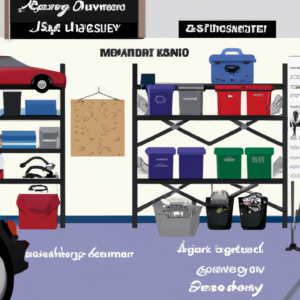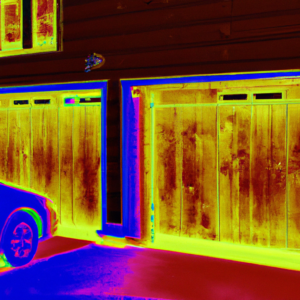Are you tired of the screeching and squealing symphony that greets you every time you open your garage door? Well, fret no more! In this article, we’ll show you how to silence your noisy garage door by giving it a little TLC. With just a few simple steps and some lubricant, you’ll be able to restore peace and tranquility to your garage. So, grab your tools and let’s get started on this harmonious journey!
Gather Necessary Tools and Materials
To gather the necessary tools and materials for lubricating your noisy garage door, you will need a few specific items. First and foremost, you will need a can of lubricant specifically designed for garage doors. Look for a product that is silicone-based, as it will provide the best lubrication and protection. Additionally, you will need a rag or cloth to wipe away any excess lubricant and to clean the door tracks. A step ladder or stool may also be necessary to reach certain areas of the garage door that require lubrication. Lastly, it is recommended to have a pair of gloves to protect your hands while applying the lubricant. With these tools and materials at hand, you will be ready to silence that noisy garage door once and for all.
Inspect the Garage Door for Any Signs of Damage or Worn-Out Parts
Check the garage door for any signs of damage or worn-out parts. To ensure the smooth operation of your garage door, it is essential to inspect it regularly. Here are some key areas to pay attention to:
-
Tracks and Rollers: Examine the tracks for any bends, dents, or obstructions. Check the rollers for wear and tear, and replace any damaged ones.
-
Springs: Inspect the springs for signs of rust, fraying, or stretching. If you notice any issues, it is crucial to replace them promptly to avoid further damage.
-
Cables and Pulleys: Check the cables for any fraying or signs of wear. Also, inspect the pulleys to ensure they are in good condition and properly aligned.
Regularly inspecting your garage door for damage or worn-out parts can help prevent bigger problems down the line and ensure the safety and functionality of your door.
Clean the Garage Door and Its Components
Before you start lubricating your garage door, it is important to clean it and its components thoroughly. This step ensures that dirt, debris, and grime are removed, allowing for a smooth and effective lubrication process. By cleaning your garage door regularly, you can prevent buildup and maintain its optimal functionality, prolonging its lifespan and reducing the need for repairs.
Proper Lubrication Technique
Clean the garage door and its components thoroughly before applying lubrication. This step is crucial to ensure that the lubricant can penetrate and protect the moving parts effectively. Here are three important things to keep in mind when cleaning your garage door and its components:
-
Remove any dirt and debris: Wipe off any accumulated dirt, dust, or grime from the door’s surface using a soft cloth or sponge. Pay attention to the tracks, rollers, hinges, and springs, as these areas tend to collect more dirt.
-
Use a mild detergent solution: Mix a small amount of mild detergent with warm water, and gently scrub the garage door and its components. This will help remove any stubborn stains or grease buildup.
-
Rinse thoroughly and dry: After cleaning, rinse the door and its components with clean water to remove any residue from the detergent. Then, use a dry cloth or towel to thoroughly dry all surfaces.
Benefits of Regular Maintenance
To ensure optimal performance and longevity of your garage door, regularly maintaining and cleaning its components is essential. By keeping your garage door and its components clean, you can prevent dirt, debris, and rust from accumulating and causing damage. Regular maintenance also allows you to identify and address any potential issues before they become major problems. Here are some benefits of regular maintenance:
| Benefits of Regular Maintenance | |
|---|---|
| 1. Extended Lifespan | Regular cleaning and maintenance can help extend the lifespan of your garage door and its components, saving you money in the long run. |
| 2. Improved Performance | Cleaning and lubricating the door tracks, rollers, and hinges can improve the smoothness and quietness of the door’s operation. |
| 3. Enhanced Safety | Regular maintenance ensures that all safety features, such as sensors and emergency release mechanisms, are in proper working order, reducing the risk of accidents. |
Apply Lubricant to the Moving Parts of the Garage Door
To effectively lubricate the moving parts of your garage door, you need to understand the benefits of lubrication, the types of lubricants available, and the proper technique to ensure optimal performance. By lubricating your garage door, you can reduce friction, noise, and wear on the components, prolonging the lifespan of your door. Different types of lubricants, such as silicone spray or white lithium grease, can be used depending on the specific parts that need lubrication.
Benefits of Lubrication
To experience the benefits of lubrication, apply a high-quality lubricant to the moving parts of your garage door. By doing so, you will enjoy the following advantages:
-
Smooth operation: Lubricating the moving parts of your garage door reduces friction and allows for smooth and quiet operation. No more annoying squeaks and grinding noises!
-
Increased lifespan: Regular lubrication helps to prevent wear and tear on the components of your garage door. This can extend the lifespan of your door and save you money on costly repairs or replacements.
-
Improved performance: Proper lubrication ensures that your garage door operates at its best. It can help the door move more efficiently and prevent unnecessary strain on the motor and other parts.
Types of Lubricants
For the lubrication of the moving parts of your garage door, you will need to choose the appropriate type of lubricant. There are several types of lubricants available on the market that can be used for this purpose. One common type is silicone-based lubricant, which is known for its ability to reduce friction and provide long-lasting lubrication. Silicone-based lubricants are also resistant to extreme temperatures and do not attract dirt or dust. Another option is lithium-based lubricant, which is known for its versatility and ability to withstand heavy loads. It is important to note that WD-40 should not be used as a lubricant for your garage door, as it is a degreaser and not suitable for long-lasting lubrication. When choosing a lubricant, make sure to read the manufacturer’s instructions and choose one that is specifically designed for garage doors.
Proper Lubrication Technique
To properly lubricate the moving parts of your garage door, you should regularly apply lubricant to ensure smooth operation and minimize noise. Here are some proper lubrication techniques to follow:
-
Clean the parts: Before applying lubricant, make sure to clean the moving parts of your garage door. Remove any dirt, debris, or old lubricant to ensure a clean surface.
-
Use the right lubricant: Choose a lubricant specifically designed for garage doors. Avoid using WD-40 or other general-purpose lubricants as they may not provide adequate protection.
-
Apply lubricant to the right areas: Focus on the hinges, rollers, tracks, and springs of your garage door. Apply the lubricant generously but avoid excessive amounts.
Following these proper lubrication techniques will help prolong the life of your garage door and keep it running smoothly and quietly.
Test the Garage Door’s Operation and Make Necessary Adjustments
Once you have lubricated your noisy garage door, it is important to test its operation and make any necessary adjustments. Begin by opening and closing the door multiple times to observe its movement. Pay attention to any unusual noises, jerky movements, or uneven operation. If you notice any issues, first check the tracks for any obstructions or debris that may be causing the problem. Clear away any dirt or debris and make sure the tracks are properly aligned. Next, inspect the springs and cables for signs of wear or damage. If you notice any frayed cables or broken springs, it is important to have them replaced by a professional. Additionally, check the balance of the door by disconnecting the opener and manually lifting the door halfway. If the door stays in place, it is properly balanced. If it falls or rises, you may need to adjust the tension of the springs. By testing and making necessary adjustments to your garage door, you can ensure its smooth and quiet operation.
Maintain Regular Lubrication for a Smooth and Quiet Garage Door Experience
To ensure a smooth and quiet garage door experience, consistently lubricate the moving parts using a high-quality garage door lubricant. Regular lubrication not only helps reduce noise, but also extends the lifespan of your garage door. Here are some important reasons why you should maintain regular lubrication:
- Reduced friction: Lubricating the moving parts of your garage door helps reduce friction, allowing for smooth and effortless operation.
- Noise reduction: Proper lubrication minimizes the squeaking and grinding noises that can occur when the door is opening or closing.
- Prevents wear and tear: Lubrication creates a protective layer on the moving components, preventing premature wear and tear caused by friction.



